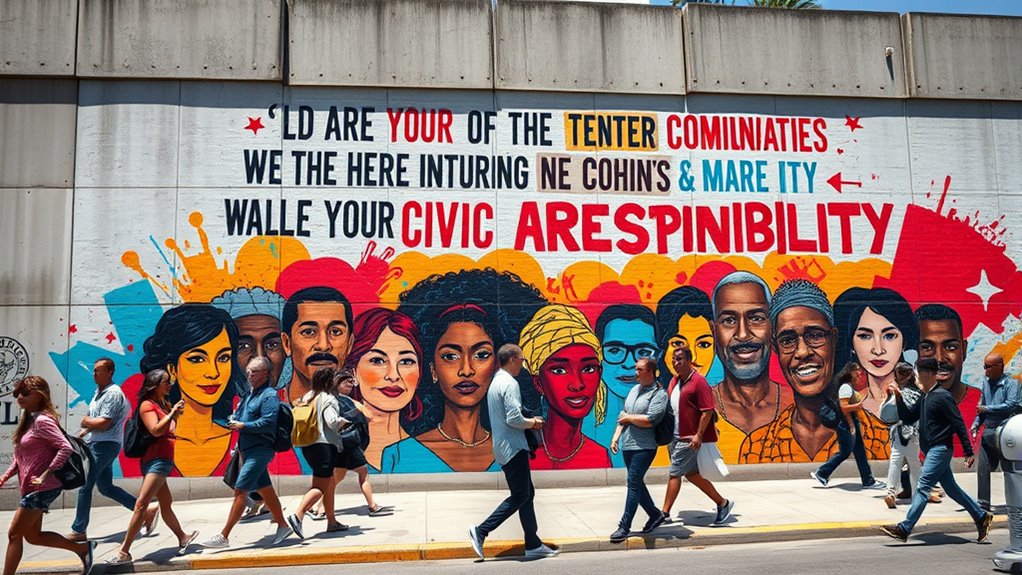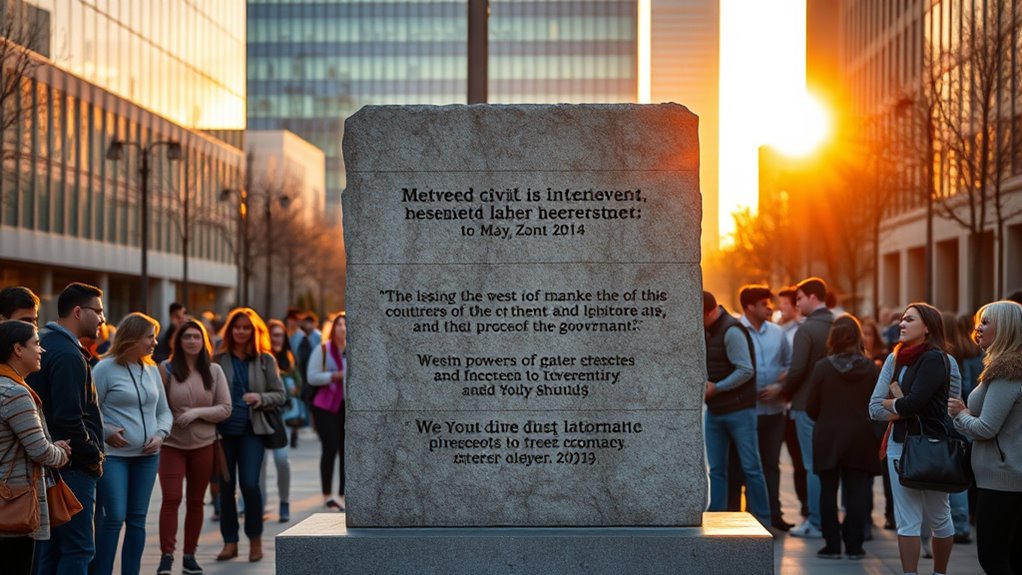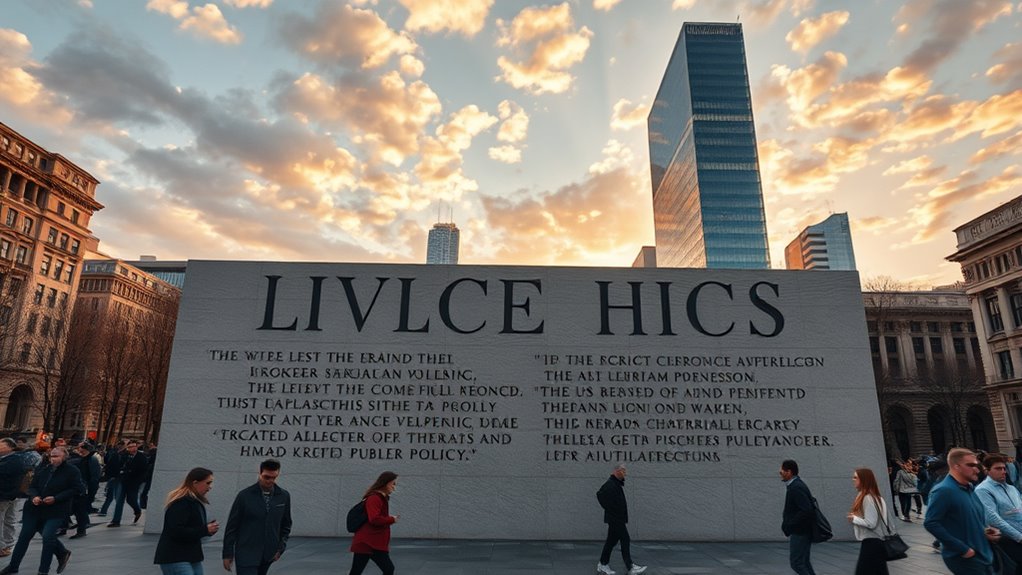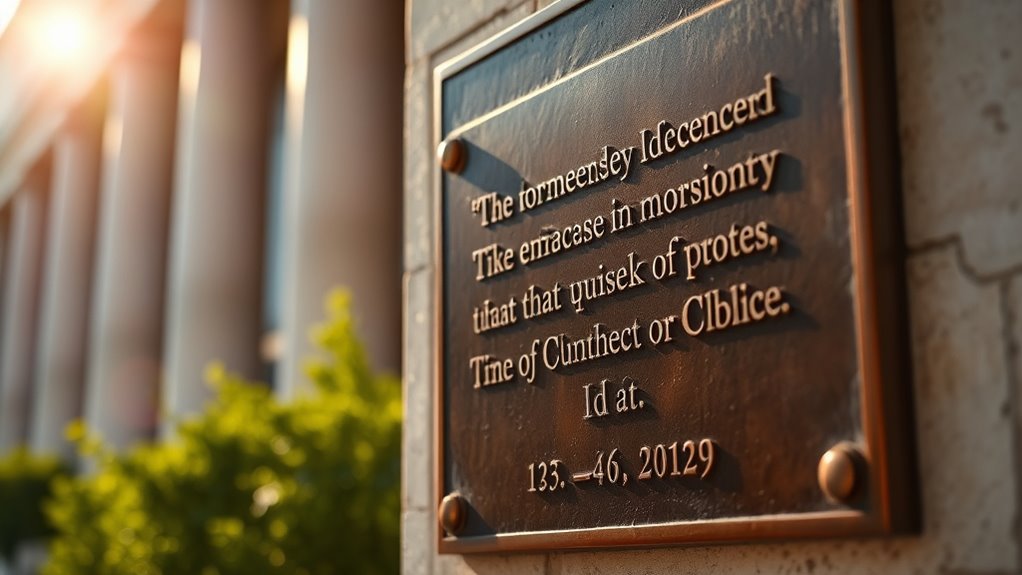Famous civic quotes often inspire justice and equality, urging you to challenge inequality and fight for fairness. They warn against complacency, reminding you that vigilance is essential to prevent setbacks and injustice. These quotes call you to civic engagement, emphasizing your role in shaping society through voting and activism. They highlight principles of good governance, like transparency and accountability, showing how words influence policy and inspire collective action. Keep exploring to discover more powerful sayings that shape public policy.
Key Takeaways
- Famous civic quotes inspire social justice, urging collective action against inequality and discrimination.
- They serve as powerful rallying cries to challenge injustice and promote societal progress.
- Civic quotes emphasize the importance of vigilance and ongoing effort to prevent setbacks in justice.
- Many highlight the role of civic engagement and responsibility in shaping effective public policy.
- Words from leaders and activists demonstrate how strategic communication influences public opinion and governance.
Quotes That Inspire Justice and Equality

Quotes have the power to inspire action and shape our understanding of justice and equality. When you hear words emphasizing social justice and equal rights, they remind you of the importance of fairness for all. These powerful statements rally communities to challenge injustice and push for change. For example, Martin Luther King Jr.’s words about justice and equality continue to motivate efforts toward a fair society. Such quotes serve as rallying cries, inspiring individuals to stand against discrimination and advocate for equal rights. They remind you that progress begins with awareness and a collective voice. By reflecting on these words, you can find the courage to support policies that promote fairness and uphold the dignity of every person.
Warnings About Complacency and the Need for Vigilance

While progress in social justice is critical, it’s equally important to remain vigilant against complacency, which can quietly erode gains over time. Civic apathy breeds political complacency, causing citizens to disengage and overlook threats to hard-won rights. When you ignore signs of stagnation or dismiss the importance of active participation, you risk allowing injustices to reemerge. History shows that complacency often precedes setbacks, as those in power may exploit apathy to weaken accountability. Staying alert ensures you recognize early warning signs and advocate for continuous change. Vigilance keeps you engaged, reminding you that progress isn’t guaranteed and must be protected through ongoing effort. Recognizing the importance of cultural content and community engagement can strengthen your resolve. Never underestimate the danger of complacency—your awareness and action are essential to preserving the justice you’ve fought for.
Calls for Civic Engagement and Responsibility

Civic engagement is the foundation of a healthy democracy, and your active participation directly influences policies and community well-being. By engaging in community activism, you help address local issues and amplify voices often unheard. Fulfilling your civic duties—such as voting, attending meetings, or volunteering—strengthens accountability and promotes shared responsibility. When you get involved, you empower others to do the same, creating a ripple effect that sustains democratic principles. Civic responsibility isn’t just an obligation; it’s a way to shape the society you want to live in. Your voice matters in shaping policies that reflect community needs. Embracing civic engagement ensures your community remains resilient, inclusive, and vibrant for future generations. Engaging in public policy discussions can further enhance your impact and understanding of societal issues.
Principles of Good Governance and Leadership

What makes a leader truly effective in governance? It’s their commitment to transparency initiatives and accountability measures. When you prioritize openness, you build trust with your community, showing you’re honest and responsible. Implementing transparency initiatives means sharing information openly, allowing citizens to see decision-making processes clearly. Accountability measures hold leaders responsible for their actions, ensuring they follow through on promises and address issues promptly. Good governance requires you to foster a culture of integrity, where leaders are answerable to the people they serve. By consistently practicing transparency and accountability, you create a strong foundation for effective leadership. These principles help prevent corruption, promote public confidence, and ensure policies serve the common good. Additionally, understanding the importance of effective communication can greatly enhance civic engagement and policy implementation. Ultimately, they’re essential for sustaining good governance and inspiring civic responsibility.
The Power of Words in Shaping Public Policy

Words have immense power to shape public policy because they influence perceptions, set agendas, and mobilize action. Rhetorical strategies play a pivotal role in how leaders communicate their messages, making complex issues understandable and compelling. Effective policy framing highlights certain aspects of a problem while downplaying others, guiding public opinion and legislative priorities. When you choose your words carefully, you can rally support or create opposition, directly impacting policy outcomes. Public figures often employ persuasive language to evoke emotions, frame debates, and influence decision-making. Recognizing the power of words enables you to understand how public policies are shaped not just by facts but by the way those facts are presented and emphasized through strategic communication. Additionally, understanding concepts like narcissism can help in analyzing the motivations behind political rhetoric and leadership styles.
Frequently Asked Questions
How Do Civic Quotes Influence Modern Policy-Making Processes?
Civic quotes influence modern policy-making by shaping public discourse and inspiring leaders. You see, they provide historical context and serve as powerful rhetorical strategies to motivate change. When policymakers reference these quotes, they connect current issues to enduring values, making their messages more compelling. This use of familiar civic wisdom helps rally support, frame debates, and guide decisions, ensuring policies resonate with the collective ideals embedded in historical civic quotes.
What Are the Limitations of Using Quotes in Shaping Policy Debates?
Like a fragile glass, quotes can easily shatter under scrutiny. You might rely on emotional appeal, but that can distort the true context, leading to misinterpretation. This limits their effectiveness in shaping policy debates, as they often lack contextual accuracy. When used indiscriminately, quotes risk oversimplifying complex issues, which can undermine informed decision-making and reduce debates to emotional reactions rather than thoughtful analysis.
How Can Quotes Effectively Motivate Citizens to Participate in Governance?
You can use quotes as powerful tools to motivate citizens by crafting compelling slogans that resonate emotionally and inspire civic engagement. When you incorporate famous or impactful quotes into motivational slogans, you tap into shared values and collective identity, encouraging people to participate in governance. Effective quotes remind citizens of their influence and responsibility, fostering a sense of community and urgency that drives active involvement in public policy and civic life.
Are There Cultural Differences in the Impact of Civic Quotes Worldwide?
Sure, cultural perceptions and global interpretations can make civic quotes work like magic—or a complete miss. You might think a quote inspiring in your country would resonate worldwide, but irony hits when different cultures interpret the message differently. While some see civic quotes as powerful motivators, others might dismiss them entirely, proving that the impact of these words truly depends on cultural nuances and perceptions across the globe.
How Do Quotes Reflect Evolving Societal Values Over Time?
You see, quotes mirror societal values that evolve with historical context and language shifts. As time passes, words change meaning, and society’s priorities shift, making quotes reflect current ideals. You can trace this evolution by comparing old and new quotes, revealing how cultural attitudes develop. This ongoing change shows how language evolution and historical moments shape public discourse, influencing what we value and how we express those values today.
Conclusion
Remember, like the flame of Prometheus, words have the power to ignite change or cast shadows of complacency. As you reflect on these quotes, realize your role in shaping justice, equality, and good governance. Your voice is the torchbearer in this ongoing civic journey. Stay vigilant, engage actively, and let your actions echo the timeless call to serve the greater good—because history’s greatest leaders show us that change begins with you.
Joy, as our Editor in Chief, ensures the highest standard of content. Her talent in writing is complemented by her attention to detail and passion for literature and culture. Joy’s expertise and love for the English language shine through in her editorial work, making each piece a testament to quality and clarity.










